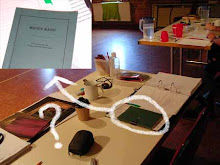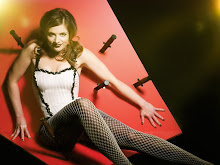
We'd welcome any feedback on the show. Shoot us a comment if you feel inclined!!
The Opening Night was roundly considered to be a great success. The energy was strong and the cast put up a really first rate performance. The woman I was sitting next to absolutely adored the show; she laughed her head off, screamed for real during the knife throwing and sighed in the all the right places. At the end of it she applauded with great enthusiasm.
But the Opening Night is not the end of the journey of the show. As mentioned previously, Chris is very aware of the show's development across the journey of the season, and beyond. The show does not suddenly become exactly the same show every single night after it opens. This is particularly the case with a new play. I caught up with Lally and Chris to ask them how they thought the show was progressing:
Being Monday; the play has had 4 runs since I last saw it. Lally, on the other hand, has been to every performance bar one. Her sense is that the play is still developing a solid sense of itself. The actors are doing great work, but she thinks that it will be the end of this week or the beginning of next week before the play matures to a point that brings the work a consistency night on night.
I ask Lally what it is that she thinks is still developing in the work. She says she feels the world of the play is still being filled out, and that there are greater layers of intricacy in the performances every night.
I ask her whether she reads reviews, and what sort of effects they have on her. She tells me that she can't help but read all the reviews as they are released. She sees the reading of reviews as part of the experience of theatre, which can brings either relief or heart break. She can take poor reviews pretty hard.
I ask Chris what he is looking for now when he watches the show after opening night. He says that there are certain 'keys' to the dramatic experience of the play that need to be there night after night for the play to work. At this stage in the process he sees his role as making sure those 'keys' stay in tact. He makes notes for the actors to remind and prompt them to maintain their focus on these keys, and encourage them to keep them working in the way he expects them to. He also looks for when the actors seem to be getting too confident or 'comfortable' in important moments. This can lead to a moment losing its excitement or 'live-ness.'
But it is not all maintenance. Chris makes the point that there are developments in the relationships between the characters, as well as between the cast and tech crew that enrich the show as it runs. There are moments that the audience's reaction validates for the performers and helps them to build their understanding of their role.
On the other hand, there are ways that an audience might respond to a performance that encourages it to develop in a way that works well for a particular scene, but does not serve the play as a whole. The most obvious example of this is in humour; an actor responding to getting 'laughs' from a scene by playing to the comedy, when something slightly more serious in tone may work better overall.
Another thing Chris looks out for is the tendency to play the pace of a scene, rather than every thought. He suggests that sometimes actors can feel good in a scene because the pace of it is right, but in fact they are skipping over the detail of each individual thought. So, he has to remind them to keep the detail in mind.
Finally, he is looking out for how long term trends in the development of the piece are effecting different individual parts. A show is usually a an intricately balanced machine, and growth in one part of it effects the parts surrounding it. By way of a simple example; a fast scene might be balanced against a series of slow scenes. However, if the series of slow scenes starts to work faster, the balancing fast scene might need to be slowed down to make the entire sequence of scenes work.
I ask Chris what place Reviews have in the artistic process. Ideally he says, they part of the fabric of the existence of the show, and should facilitate and frame discussion about the work. I ask more specifically about what effect they have on the artistic process of the show itself, rather than the broad discussion or framing of the show.
He says that he makes it a practice not to discuss reviews with the cast, or to invest too much importance in them. Chris says he thinks the opinions of peers in the industry are probably far more potent, particularly for performers, than the opinions of critics. He sees the potential effects of reviews or peer opinion much the same as the effects of the audience. They can validate good developments, but also validate developments that seem useful in isolation but don't serve the whole.
Having said that, Chris sees that the influence on the process can be much more subtle than that. By example, Chris had a lot of notes to give after the second show. He felt he had many details of the kind above to relate to the actors . The reviews that were published on the Friday were all very positive, which allowed Chris to be as direct as he wanted to be in his notes. If however, the reviews had have been negative, Chris would have felt compromised in the delivery of these notes. He feels that the actors would have been less clear as to whether these notes were brought on by Chris's understanding of the show, or as a reaction to the press.
Tuesday is Q&A day at the Malthouse. I'll be going along to that to report on what the audience asks, and what the creatives have to say in reply!




Glad to hear opening night went well. It's really interesting to hear you talk about how much the show's still developing. Looking forward to your report on the Q&A - I would have loved to be able to go to that session.
ReplyDelete